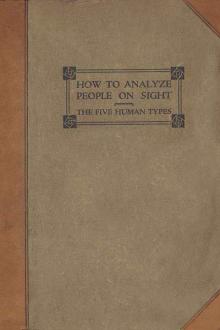How to Analyze People on Sight by Elsie Lincoln Benedict (epub read online books txt) 📕

- Author: Elsie Lincoln Benedict
- Performer: -
Book online «How to Analyze People on Sight by Elsie Lincoln Benedict (epub read online books txt) 📕». Author Elsie Lincoln Benedict
Remember, the chief distinguishing
marks of the Muscular, in the order
of their importance, are LARGE,
FIRM MUSCLES, A SQUARE
JAW and SQUARE HANDS. Any
person who has these is largely of the
Muscular type, no matter what other
types may be included in his makeup.
en and women in whom the Osseous or bony framework of the body is more highly developed than any other system are called the Osseous type.
This system consists of the bones of the body and makes what we call the skeleton.
Just as the previous systems were developed during man's biological evolution for purposes serving the needs of the organism—first, a stomach-sack, then a freight system in the form of arteries to carry the food to remoter parts of the body, and later muscles with which to move itself about—so this bony scaffolding was developed to hold the body upright and better enable it to defend and assert itself.
Man is a creature who, in spite of his height, walks erect. He can so do only by means of the support given him by his bony framework. The human body is like a tall building—the muscles are like the mortar and plaster, the bones are like the steel framework around which everything else is built and without which the structure could not stand upright.
¶ Prominent ankles, wrists, knuckles and elbows are sure signs that such an individual has a large osseous or bony element in his makeup.
When you look at any person you quickly discern whether fat, bone or muscle predominates in his construction. If fat predominates he leans toward the Alimentive, no matter what other types he may have in combination; if firm, well-defined muscles are conspicuous, he is largely Muscular; but if his bones are proportionately large for his body he has much of the Osseous type in his makeup.
¶ "Raw-boned" exactly describes the appearance of the extreme Osseous. (See Chart 7)
Such a man is a contrast to others in any group and a figure with which all of us are familiar. But that his inner nature differs as widely from others as his external appearance differs from theirs is something only recently discovered.
As we proceed through this chapter you will be interested to note how every trait attributed to this type applies with absolute accuracy to every extremely raw-boned, angular person you have ever known. You will also notice how these traits have predominated in every person whose bones were large for his body.
Though this type was the last to be classified by science it is the most extreme of them all.
¶ An impression of physical rigidity is given by the extreme Osseous. Such a man or woman looks stable, unchanging, immovable—as though he could take a stand and keep to it through thick and thin.
So vividly do very tall, angular, raw-boned people convey this impression that they are seldom approached by beggars, barked at by street vendors, or told to "step lively."
¶ The power of his physique is evident to all who look at him. The strength indicated by his large joints, angular hands and general bulk intuitively warns others to let this kind of person alone.
He is therefore unmolested for the most part, whether he walks down the streets of his home town or wanders the byways of dangerous vicinities.
¶ This type also looks rugged. He reminds us of "the rugged Rockies." He appears firm, fixed, impassive—as though everything about him was permanent.
Externals are not accidental; they always correspond to the internal nature in every form of life. And it is not accidental that the Osseous looks all of these things. He is all of them as definitely as they can be expressed in human nature.
¶ Of all human types the Osseous is the most dependable and reliable. The phrases, "that man is steady," "never flies off the handle," "always the same," etc., are invariably used concerning those of more than average bony structure.
¶ The keynote of the bony man's whole nature—mental, physical and moral—is immovability.
Once he settles into a place of any kind—a town, a home, or even a chair—he is disinclined to move. He does not settle as quickly as other types but when he does it is for a longer stay.
Think how different he is from others in this psychological trait and how it coincides exactly with his physiological structure.
The fat man lets you make temporary dents in his plans just as you make them in a piece of fat meat. But the bony man is exactly the opposite, just as bone is difficult to twist, or turn, or alter in any way. It takes a long time and much effort—but once it is changed it is there for good.
¶ Because any individual's height is determined by his skeleton, extreme tallness is a sign of a larger than average bony structure. The extreme Osseous is therefore tall.
But you must remember that large joints are more significant than height. Even when found in short people they indicate a large osseous tendency.
¶ So bear in mind that any person whose bones are large for his body is somewhat of the Osseous type, regardless of whether he is short or tall and regardless of how much fat or muscle he may have. The large-jointed person when fat is an Osseous-Alimentive. A large-jointed man of muscle would be an Osseous-Muscular.
¶ A very short person then may be predominantly Osseous if his bones are proportionately large for his body. Such an individual is called a "Small Osseous."
A head that is high for his body and inclines to be straight up and down goes with the extreme Osseous type. (See Chart 8) It does not resemble a sphere like the Alimentive, is not kite-shaped like the Thoracic, nor square like the Muscular. It is higher than any of the others, stands on a longer, more angular neck, and his "Adam's Apple" is usually in evidence.
¶ Like each of the other types, the Osseous is a result of a certain environment. Rigorous, remote regions require just such people, and these finally gave rise to this stoical nature. The outposts of civilization are responsible for his evolution.
Pioneering, with its hardship, its menacing cold and dearth of comforts, in far countries at last produced a man who could stand them, who could "live through" almost anything and still dominate his surroundings.
¶ The Osseous does not give way to his feelings. He keeps his griefs, sorrows, ambitions and most of his real opinions to himself. He is the farthest from a "softie" of any type.
If you desire to know at once what kind of person the Osseous is, put the Alimentive and Thoracic types together and mix them thoroughly. The Osseous is the opposite of that mixture.
Each and every trait he possesses is one whose exact opposite you will find in one or the other of these first two types.
¶ As we go on in this chapter you will see why all kinds of people make up the world, for Nature has outdone herself in the distinctions between the five human types.
Each type is made up of certain groups of traits with which we have come in contact all our lives but which we have never classified; and each "set" of traits comprising a type has a consistency which nothing less than Mother Nature could have produced. You will be interested to see how accurate are the statements concerning each type and how they are proven again and again in every type you associate with.
Guesswork is no longer necessary in the sizing up of strangers. You can know them better than their mothers know them if you will get these nutshells of facts clearly in your mind and then apply them.
¶ Cheek bones standing higher than the average are always indicative either of a large Thoracic or a large Osseous element.
If the distance between the cheeks is so wide as to make this the widest section of the face, it is probable that the person is more Thoracic than Osseous. But if his face is narrow across the cheek bones, and especially if it runs perpendicularly down to the jaw-corners from that point instead of tapering, the person is large of the Osseous type.
¶ An oblong is what the Osseous brings to mind. His body outlines approximate the oblong—a squareness plus length. He is full of right angles and sharp corners. (See Chart 7)
His face is built on the oblong (See Chart 8) and if you will notice the side-head of the next Osseous man you meet you will see that even a side view presents more nearly the appearance of the oblong than of any other geometrical figure.
¶ "The gnarled hand" well describes that of the Osseous. The hand outlines of this type also approximate the oblong. (See Chart 8) It runs straight down instead of tapering when the fingers are held close together.
The hand of the Osseous matches his body, head and face. It is bony, angular, large-jointed and as rigid as it looks. The inflexibility of his hand is always apparent in his handshake.
¶ Knotty fingers characterize the hands of this type. Their irregular appearance comes from the size of the joints which are large, in keeping with all the joints running throughout his organism.
Everything in one of Nature's creatures matches the other parts. Agassiz, the great naturalist, when given the scale of a fish could reconstruct for you the complete organism of the type of fish from which it came. Give a tree-leaf to a botanist and he will reconstruct the size, shape, structure and color of the tree back of it. He will describe to you its native environment and its functions; what its bark, blossoms and branches look like and what to do to make it grow.
¶ Nature has no accidents. With her everything is organized, everything has a purpose, and every part of a thing, inside and out, matches the whole. So the hand of the Osseous and the face of the Osseous match the body and head.
This is also true of every other type. The Alimentive has small, fat, dimpled hands and feet like his body; the Thoracic has tapering hands and feet to match his face and body; the Muscular's body, hands and feet are all square; but the Osseous has a bony body, so his hands and feet are equally bony.
¶ "He is too slow for me," you have heard some one say of another. Perhaps you heard it said today. Review the outward appearance of all the people you know who have this reputation, from those of your earliest childhood down to that person of whom it was spoken today—and you will find that every one of them resembled the bony type we have just been describing.
Look back and call to mind the appearance of





Comments (0)